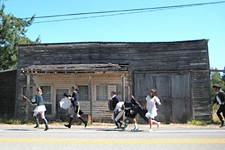Still Bringing It
Jessica Bendinger on the 10th anniversary of her snarky cheer comedy 'Bring It On'
By Kimberley Jones, Fri., March 19, 2010

Most writers are good on page and near pathological in person, but Jessica Bendinger gives great conversation. She rocketed to success 10 years ago with her first original script, Bring It On, which ruled the box office and launched a franchise – but only after it was famously rejected 27 times. A comedy about competitive high school cheerleading, Bring It On is fresh, quippy, and quick on its feet – not unlike its creator, who is both funny and forthcoming when talking about Bring It On's franchise payouts ("I got fucked every way you can get fucked on that") and the winding career path that's taken her from Bring It On to to the writers' room ofthe critically acclaimed fourth season of Sex and the City to her directorial debut, the acerbic gymnastics comedy Stick It, and a new young adult novel, The Seven Rays, which Bendinger will adapt and direct.
"I'm a curious little hobbit," Bendinger told the Chronicle in a phone conversation in early March. "I like to see where the winds are going." Next week, they'll be going in the direction of Austin, when the Austin Film Festival screens Bring It On with Bendinger in attendance for a post-screening chat.
Austin Chronicle: I just rewatched the film last night with a friend, and she knew every single word. Have you been surprised at all by its legs?
Jessica Bendinger: Yes and no. You always hope for that sort of success, and certainly I knew I was tapping into something. ... My dad's an ad man, so I am a little strategic in terms of my original material what I write about.
AC: You really anticipated the direction pop culture was going in – the snarky sensibility, the clippy shorthand.
JB: Teenage language and the language of young people is always changing. ... Every generation is kind of inventing their own stuff. If you can just make it sound invented and close enough, people won't care. But they won't forgive you if it is really time-stamped, like a milk carton.
I wrote the movie in '97 or '98, and it didn't come out until 2000. I was plugging into more gestalt ideas. It just turned out I was right. You know, in a kind of Malcolm Gladwell – [laughs] in a Gladwellian way.
By the way, I worked with him, too, no accident. I worked with him before Bring It On came out, on a movie called Cool Hunt which never came to be. It was about the cool-hunters he profiled in The New Yorker. They're one of the chapters in The Tipping Point.
So I was definitely very intrigued by all that stuff. It's one of my interests – tapping into the collective and seeing what you can mine out of it. So I cannot claim ignorance completely. Nor can I claim total hubris – but there was a little bit of strategery, as Will Ferrell would say.
[Gladwell] wasn't known then either. It's really about following your enthusiasms – you know, talk about cheerleading as metaphor for life. I read that article and was blown away and I doggedly pursued it. And my agent really helped me because he got it too. Needless to say, the company I wrote it for imploded, Danny Devito's company, Jersey Films, kind of imploded and there were other issues. But yeah, i was just definitely intrigued. And sure enough, trend forecasting and all that Faith Popcorn stuff and Malcolm himself have totally exploded into a thing of the decade.
I don't know. I'm a curious little hobbit. I like to see where the winds are going. I think I have an interesting way of doing it.
AC: Sex and the City, of course, was another cultural zeitgeist.
JB: When Bring It On was number one the second week in a row, they asked me if I would come work on the show. I was like, 'I have the number one movie two weeks in a row, why would I want to work on [Sex and the City]? Your show jumped the shark – it ended with drag queens on a rooftop!' You have to remember, the end of the season three was very critically lambasted. So going into it, people were like, 'Oh,it's over. Sex and the City is done.'
But they regrouped and I think they took the criticism to heart somewhat. It was a good season. It was a real defining season to be on the show – the more serious season, it got a little more grounded, to their credit.
They had a lot of rules about the girls and what they could and couldn't do. And they had a couple outsiders that they brought in that season and we were like, 'Why? Why do you have that rule? Why? Why?' You know, just annoying people. We were pushing them out of some rules they'd set up, like, 'We can never talk about family?' 'Why? That's dumb!' Michael Patrick [King] had a thing where, 'No, we don't want them ever to go to their hometown.'
AC: Wait, is that the season where Miranda's mom dies? That's a great season.
JB: Yeah! It's a much different tonally season. They were willing to go to darker places, to their credit. The cheating with Aidan – the room was really split about whether [Carrie Bradshaw] should be with Aidan or with Big. Passionate arguments on both sides, and I think to our credit, we were willing to enter into the conflict of that in a really genuine way. Say, she gets back with Aidan – I've had boyfriends who were very punitive. My episode, in fact, "Time and Punishment," is about Aidan punishing her for the cheat – like he kind of can't get over it.
It was good. It was a good season to be on the show, definitely.
AC: Obviously, that was an adult-oriented show, but you seem to gravitate toward teen protagonists.
JB: You have to understand, I'm a fag hag, first and foremost. That's another one of my secrets: I'm totally revisiting the site of the most damage for myself. My biggest traumas came in high school – particularly the last two years of high school were a kind of hell I would not wish on anyone. So I keep going back and trying to fix it and make it better and heal it. I have a very compassionate perspective given what I went through.
However, I started modeling as a teenager, and gay men were my salvation. They were the people who gave me self-esteem. I was tall, braces, all my eyelashes fell out from stress. I was a complete mess – you could put some makeup on me, and suddenly I was a model. But gay men were absolutely the source of my self-esteem from the age of 17 on. Like, they really helped me build that. 'Cause I didn't have it. And gay men and teenage girls are very similar. They're both obsessed with boys, and they're both obsessed with beauty products and fashion. ... With the advent of gays in the culture, I think I was also a little ahead of the curve with that, being more out about that. Not that I'm gay, but I worship gay men. They are the creative zeitgeist of so many industries, right? If you look at the snarkiness of Bring It On, it's like teenage girls acting like gay guys with each other. If you use that filter over it, I think that's why it's so contemporary. ... I was really using that kind of edginess in Bring It On. And Stick It has it, too. Stick It is really gay men in leotards.
The Austin Film Festival presents a special screening of Bring It On, followed by a Conversations in Film seminar with screenwriter Jessica Bendinger on Thursday, March 25, 7:30pm, at the Alamo Lake Creek (13729 Research). See www.austinfilmfestival.com for ticket info.
Bendinger will also do a booksigning for The Seven Rays at the Barnes & Noble Arboretum (10000 Research) at 5:30pm.













